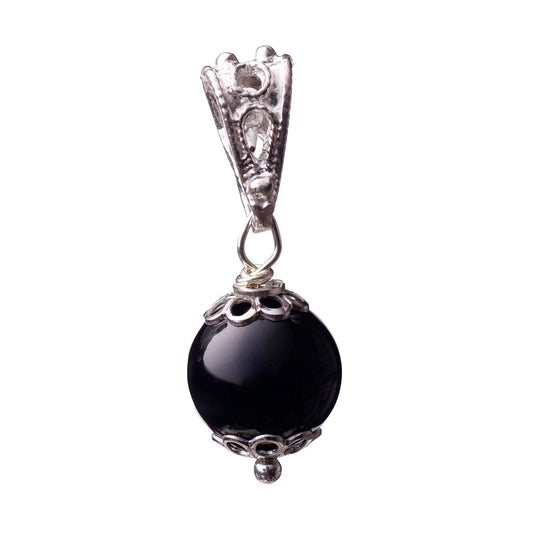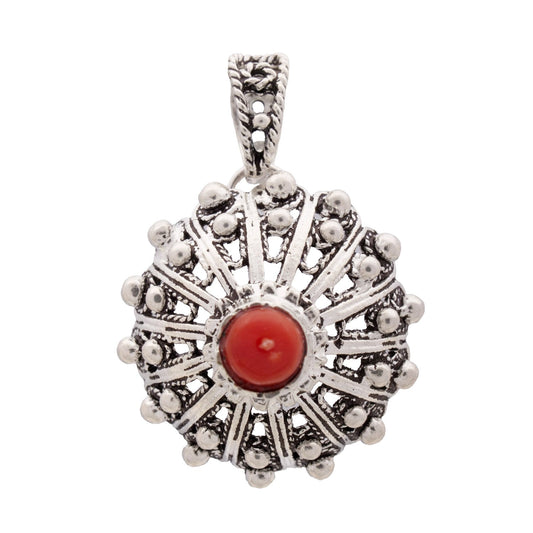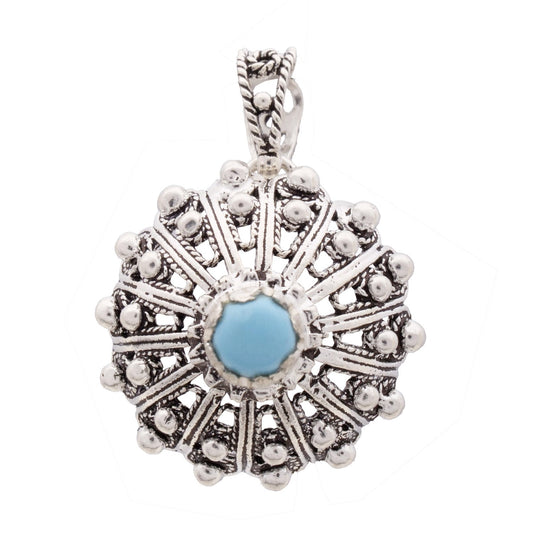
Sardinian earrings
-
Sardinia can be said to have a material culture heritage, consisting of its Jewelry, which has been part of the island’s history for millennia.
This heritage of jewelry is closely linked to traditional Sardinian clothing (which is still present today in the island's towns during all major festivals and ceremonies: from the Feast of Saint Efisio in Cagliari, to the Cavalcata Sarda in Sassari, to the Feast of Saint Simplicio in Olbia, and many others) and complements it with decorative elements.
While men's clothing jewelry consists simply of silver buttons that fasten the shirt, typical women's clothing, especially festive attire, has always been adorned with silver or gold buttons hanging from the sleeves, a gold necklace, and several chains of the same material, with fingers covered in rings and earrings, either hoops or with pendants.
Jewelry was passed down from generation to generation and was also seen as an investment. In fact, they had an economic value that allowed them to be used as "exchange currency" useful for purchasing what was needed in proportion to their actual value.
-

-
Filigree Silver Earrings.
-
Pendant "Su Coccu," Onyx and Silver Filigree
Regular price €15,00 EURRegular priceUnit price / per -
Pendant with "Sardinian Button" and coral stone
Regular price €66,00 EURRegular priceUnit price / per -
Pendant with "Sardinian Button" and turquoise
Regular price €66,00 EURRegular priceUnit price / per
-
Sardinian Earrings and Crafts
Sardinian crafts are famous for their authenticity and the manual skill of their artisans. Each piece is unique and reflects the craftsmanship of the artisan who created it. Sardinian handcrafted earrings are characterized by finely worked details. They have different names depending on their shape: "lorigas" refers to hoop earrings, which are crafted to represent the figure of a dog or a rooster, and "arracadas" are so named if they have a support for a pendant made of coral or glass paste. In the south of the island, the "navicella" earring, made of two curved plates welded together, and the "fiocco" earring, with a bow-shaped pendant made on a gold support with pearls, are commonly used. In Logudoro, the most common earrings are hoops with a red coral cameo and a pendant of the same material. One noticeable feature is the continuous presence of coral in these jewels, which has always been seen as a symbol of good fortune and protection. Traditionally, it was believed to help ward off evil spirits and maintain health and safety. Additionally, it was often associated with beauty and elegance. Another element featured in many Sardinian jewels, including earrings, is the "Corbula," one of the most emblematic symbols of Sardinian craftsmanship, representing fertility, prosperity, maternal nurturing, the deep connection to the land, and the agricultural traditions of Sardinia. Traditionally, "Sa corbula" was a basket, without handles and hand-woven. It was part of the bride’s dowry and was used at home for preparing bread and sweets.
-

-
What is the name of the typical processing technique for Sardinian jewelry?
The typical processing technique for Sardinian jewelry is called "filigree," which dates back to the third millennium BC. It involves intertwining two metal wires, usually made of silver or gold, which are twisted and flattened. The twisting occurs mechanically, with the two wires intertwining as they twist around a wooden spindle that rotates at an appropriate speed. The wires are passed through rollers, which allows them to stretch and achieve an increasingly smaller diameter. The flattening phase is carried out with a wire-flattening mill.
Next is the "scafatura" phase: the filigree is wound upon itself, and once several elements are obtained, they are immersed in the scafatura until cooled, after which they proceed to welding. The objects obtained from welding have a color similar to dirty silver, so they need to be whitened, which is achieved through annealing and subsequent immersion in a sulfuric acid solution. This process is repeated until the final effect is achieved. Once the object becomes silver, it can undergo another treatment if a gold plating effect is desired.
There are also alternative techniques for creating jewelry: lost wax casting. This processing technique, known for over 2,000 years, is still used today both for reproducing statues and monuments as well as in the world of jewelry. It is a technique passed down through millennia from generation to generation, without innovations, until it was also adopted by dentists for applying prosthetic methods. -

-
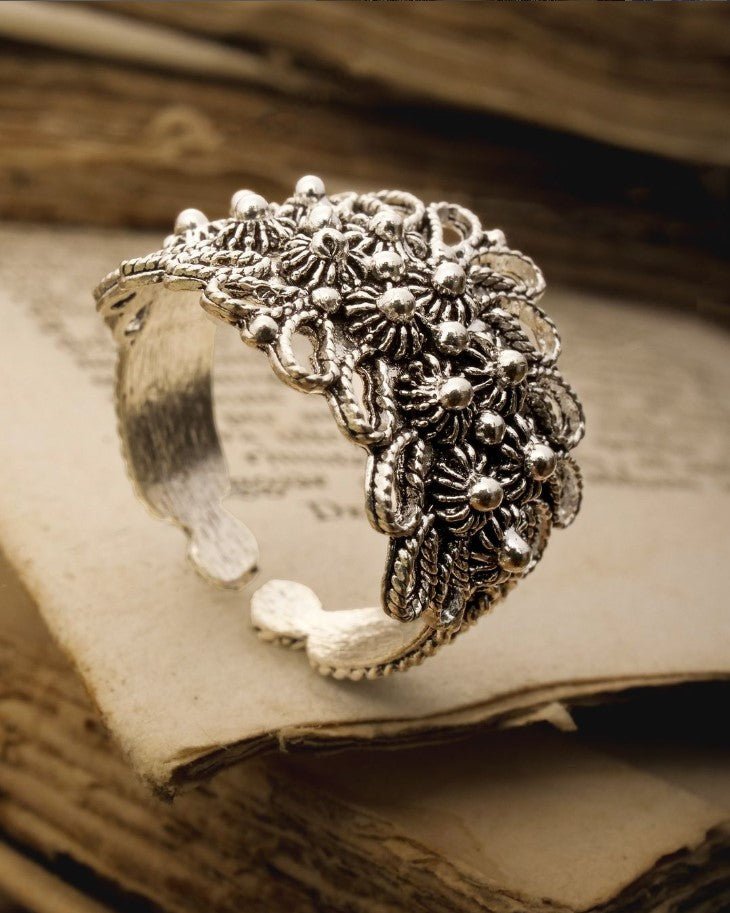
Sardinian Wedding Rings
The Sardinian wedding ring is the quintessential Sardinian jewel. Crafted in silver...
-
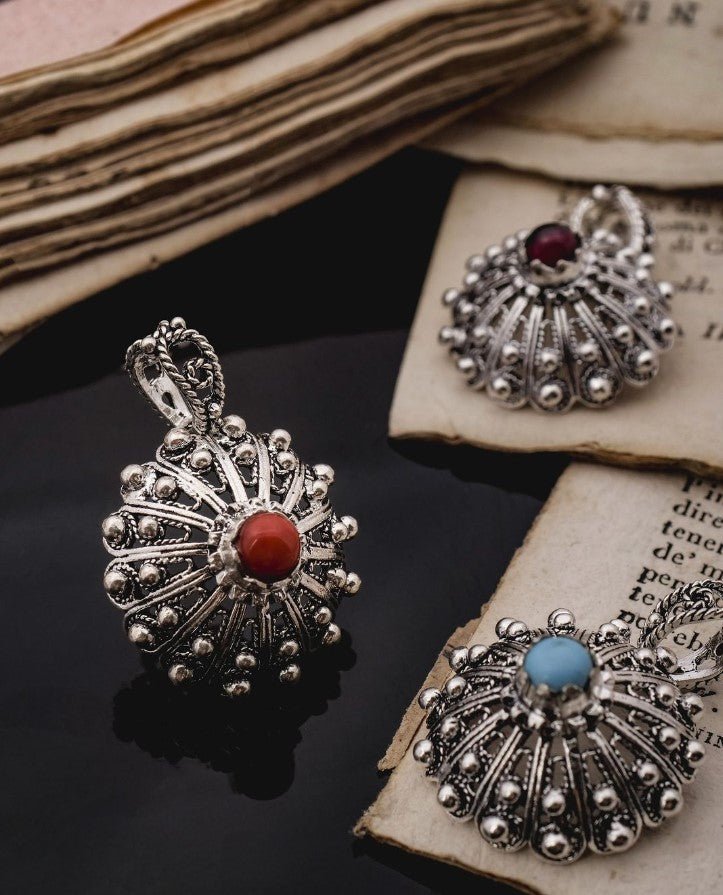
Earrings, Pendants, and Buttons
Our selection of Sardinian jewelry in silver filigree and gemstones. We have...
Continue reading our Blog
-

Consigli e Suggerimenti sulle Tovaglie di Natale
Consigli e Suggerimenti sulle Tovaglie di Natale: Scopri come scegliere le tovaglie perfette per creare un'atmosfera calda e accogliente durante le feste natalizie. Idee di stile, colori, e decorazioni per...
Consigli e Suggerimenti sulle Tovaglie di Natale
Consigli e Suggerimenti sulle Tovaglie di Natale: Scopri come scegliere le tovaglie perfette per creare un'atmosfera calda e accogliente durante le feste natalizie. Idee di stile, colori, e decorazioni per...
-

I Coltelli Artigianali Sardi
I coltelli artigianali sardi, simbolo della cultura agropastorale, uniscono tradizione e abilità. Forgiati a mano dai coltellinai, mantengono vivo il legame con il passato attraverso tecniche antiche e un'estetica unica. Scopri...
I Coltelli Artigianali Sardi
I coltelli artigianali sardi, simbolo della cultura agropastorale, uniscono tradizione e abilità. Forgiati a mano dai coltellinai, mantengono vivo il legame con il passato attraverso tecniche antiche e un'estetica unica. Scopri...
-

Le tradizioni culinarie sarde per Ognissanti
In Sardegna, le festività di Ognissanti e dei Morti rappresentano un momento per mantenere vive antiche tradizioni che fanno parte della memoria collettiva. Durante questa settimana, in tutta l'isola, si...
Le tradizioni culinarie sarde per Ognissanti
In Sardegna, le festività di Ognissanti e dei Morti rappresentano un momento per mantenere vive antiche tradizioni che fanno parte della memoria collettiva. Durante questa settimana, in tutta l'isola, si...


